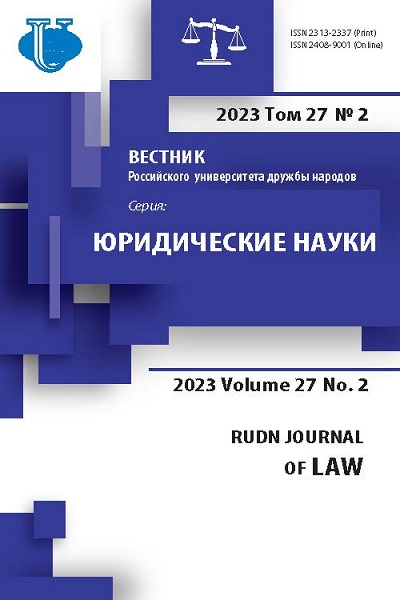Issues of foundations and criteria of law: criticism of the theory of social rules and conventional rule of recognition in “early” R. Dworkin’s doctrine
- Authors: Kasatkin S.N.1
-
Affiliations:
- Samara State University of Economics
- Issue: Vol 27, No 2 (2023)
- Pages: 288-308
- Section: STATE AND LAW IN CONTEMPORARY WORLD
- URL: https://journals.rudn.ru/law/article/view/35025
- DOI: https://doi.org/10.22363/2313-2337-2023-27-2-288-308
- EDN: https://elibrary.ru/SFWNCD
- ID: 35025
Cite item
Abstract
The article investigates the doctrine of an American jurist, Ronald Dworkin, presented in the essay “Social Rules and Legal Theory” (1972) and considered as a stage in his large-scale polemics with legal positivism. In this doctrine the author criticizes the theory of “social rules” and the conventional “rule of recognition”, which is basic for his opponents. The theory requires an agreed unity of practice and defends the controversial character and moral engagement of normative grounds and criteria of law, their priority and autonomy against community practices. The relevance of the topic is due both to the fundamental nature of the Dworkin - positivists dispute, and peculiarities of the 1972 doctrine, which formed a number of its “cross-cutting” elements. The article is aimed at systematization and assessment of the 1972 doctrine, relies on the texts by its author, his opponents and researchers, and uses various tools, primarily the ideological and historical method, focused on explication of views and issues developing in the history of thought. The study results are generalization of original components of R. Dworkin’s 1972 doctrine, its localization within the dispute between the author and positivists and discerning its ideological and historical implications. Summing up the article emphasizes a stimulating role of the 1972 doctrine for evolution of the rival approaches, as well as its potential for the philosophy of law, associated with R. Dworkin’s problematization of a link between normativity and facticity in law, linguistic-analytical idea of a rule as a practice, and conventionalist account of foundations of law which decenters normative disagreements.
About the authors
Sergei N. Kasatkin
Samara State University of Economics
Author for correspondence.
Email: kasatka_s@bk.ru
ORCID iD: 0000-0001-5541-9181
SPIN-code: 6195-5396
Candidate of Legal Sciences, Associate Professor at Theory of Law and Philosophy Department
141 Soviet Army str., Samara, 443090, Russian FederationReferences
- Alexy, R. (2010) A Theory of legal argumentation. Oxford, Oxford University Press.
- Bayles, M. (1991) Hart vs. Dworkin. Law and Philosophy. (10), 349-381.
- Coleman, J.L. (2002) Negative and positive positivism. In: Coleman, J.L. Markets, Morals, and the Law. Oxford, Oxford University Press, pp. 3-27.
- Dworkin, R. (1967) The model of rules. University of Chicago Law Review. (35), 14-46.
- Dworkin, R. (1972) Social rules and legal theory. Yale Law Journal. 81(5), 855-890.
- Dworkin, R. (1978) Taking rights seriously. (2nd ed. with Reply to Critics) Cambridge, MA, Harvard University Press.
- Dworkin, R. (1985) A Matter of Principle. Cambridge, MA, Harvard University Press.
- Dworkin, R. (1986). Law’s Empire. Cambridge, MA, Harvard University Press.
- Hart, H.L.A. (1958) Positivism and the separation of law and morals. Harvard Law Review. (71), 593-629.
- Hart, H.L.A. (1961) The concept of law. Oxford, Clarendon Press.
- Hart, H.L.A. (1994) The concept of law. (2nd ed. with Postscript) Oxford, Clarendon Press.
- Leiter, B. (2003) Beyond the Hart/Dworkin Debate: The Methodology Problem in Jurisprudence. Available at: https://ssrn.com/abstract=312781 [Accessed 1st August 2022].
- Pattaro, E. (2005) A Treatise of legal philosophy and general jurisprudence. Vol. 1. Dordrecht, Springer.
- Patterson, D. (2021) Dworkin’s Critique of Hart’s Positivism. In: Spaak, T. & Mindus, P. (eds.). Cambridge Companion to Legal Positivism. Cambridge, Cambridge University Press, pp. 675-694.
- Perry, S. (1997). Two models of principles. Iowa Law Review. (82), 787-819.
- Postema, G.J. (2011) A Treatise of Legal Philosophy and General Jurisprudence. Vol. 11. Dordrecht, Springer.
- Priel, D. (2020) Making sense of nonsense jurisprudence. Available at: http://ssrn.com/abstract=3696933 [Accessed 1st August 2022].
- Raz, J. (1979) The Authority of Law. Oxford, Oxford University Press.
- Raz, J. (1983) Legal principles and the limits of law. In: Cohen, M. (ed.) Ronald Dworkin and Contemporary Jurisprudence. Totowa, NJ, Rowman & Allenheld, pp. 73-87.
- Raz, J. (1990) Practical reasons and norms. (2nd ed.) Oxford, Oxford University Press.
- Sartorius, R. (1971) Social policy and judicial legislation. American Philosophical Quarterly. (8), 151-160.
- Schauer, F. (2006) (Re)Taking Hart. Harvard Law Review. 119(3), 852-883.
- Shapiro, S. (2007) The «Hart-Dworkin» Debate: A Short Guide for the Perplexed. Available at: http://dx.doi.org/10.2139/ssrn.968657. [Accessed 1st August 2022]
- Zipursky, B. (2001) The model of social facts. In: Coleman, J. (ed.). Hart’s Postscript. Oxford, Oxford University Press, pp. 219-270.
- Wittgenstein, L. (1958). Philosophical investigations. (2nd ed.) Oxford, Blackwell.
Supplementary files















